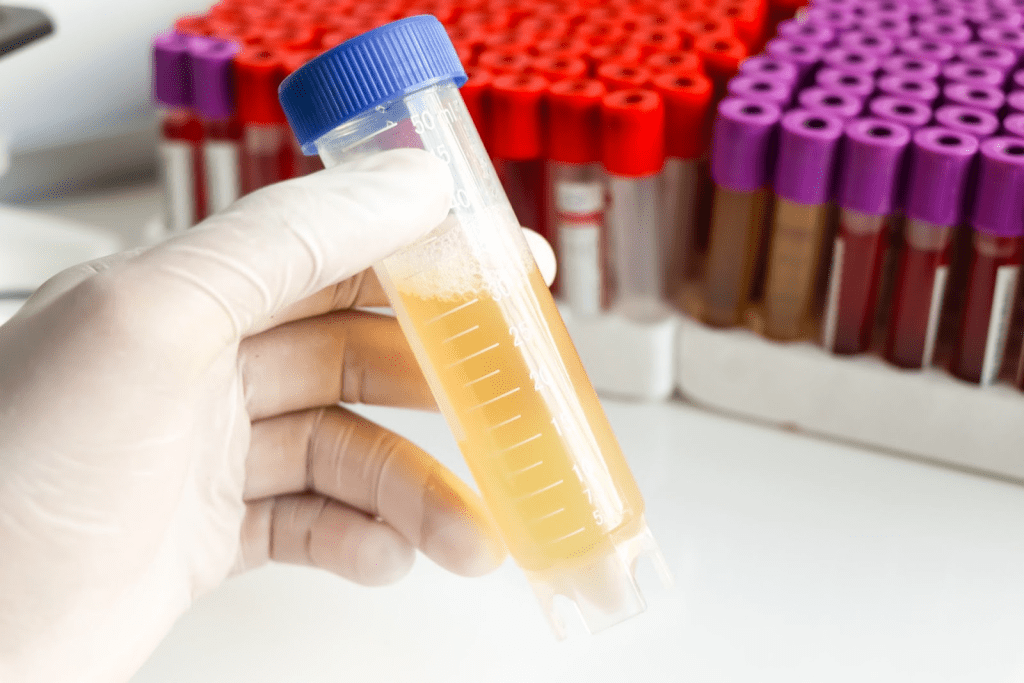Last Updated on November 25, 2025 by
What medications cause high leukocytes in urine? Learn the dangerous, crucial drugs that can elevate leukocyte esterase levels in your urinalysis.
Elevated leukocytes in urine often mean there’s an infection or inflammation. At Liv Hospital, we focus on finding the reasons behind high white blood cell counts in urine.
Some medicines can make white blood cells in urine go up. This includes NSAIDs, steroids, and proton pump inhibitors (PPIs). We’ll look at these medicines and how they affect urine leukocytes, helping you understand diagnosis and treatment.

It’s key to know what high leukocytes mean for treatment. Our team at Liv Hospital aims to give top-notch care. We support and guide our patients every step of the way.
Leukocytes, or white blood cells, are key to fighting infections. They are vital for our immune system. Knowing about leukocytes helps us understand urinary tract problems.

Leukocytes come from the bone marrow. They move through the blood and lymphatic system. They protect us from infections and diseases.
There are different types of leukocytes. Each type has its own role in fighting off infections. When they find harmful microorganisms, they destroy them. This keeps our body healthy and stops infections from spreading.
Usually, urine doesn’t have many leukocytes. But if you find leukocytes in your urine, it might mean you have a problem. This could be a urinary tract infection, inflammation, or something else affecting your urinary system.
A urinalysis test can check if leukocyte levels are off. WebMD says finding leukocytes in urine means you might need to see a doctor.
If you’re feeling like you need to pee a lot, it hurts when you pee, or you have stomach pain, see a doctor. They can figure out what’s wrong and help you feel better.
Leukocyte esterase tests are used in urinalysis to find leukocytes. This enzyme is made by leukocytes and shows up in urine when there’s an infection or inflammation. These tests help us diagnose urinary tract infections and other urinary system issues.
The test uses a dipstick that changes color if leukocyte esterase is present. It’s part of a standard urinalysis and often used with nitrite tests to spot urinary tract infections. This dipstick test is quick, easy, and doesn’t hurt.
Leukocytes in urine release esterase, which reacts with the dipstick’s chemicals. This reaction changes the color. The color’s intensity shows how much leukocyte esterase is there, giving a rough idea of the leukocytes in the urine.
Understanding leukocyte esterase test results means looking at the bigger picture. A positive result means leukocytes are in the urine. This could be due to a urinary tract infection, inflammation, or other urinary tract issues.
A negative result doesn’t mean there’s no infection. Some infections might not show up in the test. So, we look at all the urinalysis results, the patient’s symptoms, and their medical history together.
Sometimes, more tests are needed to confirm a diagnosis or find the cause of a positive test. This might include urine cultures, imaging, or more clinical checks.
NSAIDs, a common pain reliever, can cause leukocyturia in some people. These drugs are used for pain and inflammation. But, they can also affect urine leukocyte levels, which is important for doctors and patients to know.

Ibuprofen and naproxen can change urine leukocyte levels. They help with pain and inflammation from arthritis and menstrual cramps. Knowing how they affect urine tests is key for correct diagnosis and treatment.
Other NSAIDs like diclofenac and indomethacin can also cause leukocyturia. Since these drugs are used a lot, it’s important to be aware of their effects on urine tests.
NSAIDs affect the body’s inflammation response. They block COX enzymes, which are important for making prostaglandins. Prostaglandins help with inflammation. By reducing prostaglandin, NSAIDs lessen inflammation but can also change urine leukocyte levels.
Knowing how NSAIDs cause leukocyturia helps doctors tell if it’s from the drug or a real health issue. This is important for managing patients’ rights and avoiding wrong treatments.
Corticosteroids can weaken the immune system. This can affect how many white blood cells are in the urine. These medicines, like prednisone and dexamethasone, help treat inflammation and autoimmune diseases.
Prednisone is used for asthma, rheumatoid arthritis, and allergies. Dexamethasone is very strong and used for croup in kids and in chemotherapy.
Other steroids, like hydrocortisone and methylprednisolone, also weaken the immune system. This can change how many white blood cells are in the urine.
Corticosteroids stop certain immune cells from working. This makes it harder for the body to fight off infections. It can lead to leukocyturia, or white blood cells in the urine.
“Corticosteroids can alter the urinary sediment by reducing the number of white blood cells, but they can also mask the symptoms of underlying infections, making diagnosis more challenging.”
It’s important for doctors to understand how corticosteroids affect urine white blood cells. This helps them care for patients better, especially when dealing with urinary tract infections.
Antibiotics are key in fighting bacterial infections. But they can sometimes cause more leukocytes in urine. This might be because of how the body reacts to the treatment or because of the antibiotic’s side effects. We’ll look at which antibiotics can cause this and how to tell if it’s a normal reaction or a bad side effect.
Several types of antibiotics can change urine leukocyte counts. These include:
Each of these antibiotic classes can affect urine leukocyte levels in different ways.
Telling apart a normal response to antibiotics and a bad side effect is key. A normal response might be a temporary increase in leukocytes as the body fights off dying bacteria. But if the levels stay high or get worse, it could mean a bad side effect, like an allergic reaction or irritation in the urinary tract.
It’s important for healthcare providers to understand how antibiotics affect urine health. This helps them make better decisions for their patients.
Certain medications, like diuretics and PPIs, can change how white blood cells show up in urine. It’s key to know this to care for patients well.
Diuretics help with high blood pressure and swelling. Furosemide and hydrochlorothiazide are types used often. Studies show they can affect white blood cells in urine, but how is still a mystery.
It might be because diuretics change how urine flows and concentrates. This could impact white blood cells in the urine. We need to think about this when looking at urine tests for patients on these drugs.
Proton pump inhibitors (PPIs), like omeprazole, treat stomach issues like acid reflux and ulcers. They’re usually safe, but might change white blood cells in urine.
It’s not clear how PPIs affect these cells. But changes in body acid levels or immune system effects might be involved. We should watch for these effects in patients on PPIs for a long time.
Knowing how diuretics and PPIs affect white blood cells helps doctors make better choices for patients. This includes how to test and treat them.
It’s important to tell the difference between leukocyturia caused by medicine and real health problems. Leukocyturia means there are white blood cells in the urine. It can happen for many reasons, like some medicines or health issues. Knowing the cause helps us treat the patient correctly.
Sterile pyuria means there are white blood cells in the urine but no bacteria. It’s often due to medicines or inflammation. On the other hand, urinary tract infections (UTIs) are caused by bacteria. Telling these apart is key to choosing the right treatment.
We look at the patient’s symptoms, lab results, and medical history to figure it out. For example, UTIs often cause pain when peeing and needing to pee a lot. Sterile pyuria might not have symptoms or might show symptoms of the underlying issue.
When we’re not sure why there are white blood cells in the urine, we need to dig deeper. We use a mix of checking the patient, lab tests, and sometimes pictures of the body to find out why.
Our methods might include:
By carefully looking at these things, we can figure out why there are white blood cells in the urine. Then, we can make a plan to help the patient.
It’s key to manage and watch over patients on meds that can lead to leukocyturia. We’ve talked about how NSAIDs, corticosteroids, antibiotics, diuretics, and proton pump inhibitors can impact urine. This is important for keeping patients healthy and avoiding problems.
Healthcare teams need to team up with patients to keep an eye on their urinary health. Knowing how meds can cause leukocyturia helps doctors give better care. For example, UnityPoint Urgent Care helps with urinary issues, including those from meds.
It’s important to watch how meds affect patients to tell if it’s just the meds or something more serious. This way, we can make sure patients get the best care. With careful watching and management, we can meet each patient’s needs well.
Leukocytes, or white blood cells, are key to our immune system. They fight infections and protect us from diseases.
High leukocytes in urine can mean you have an infection or inflammation. It’s a sign you might need to see a doctor.
A test finds leukocyte esterase in urine. It shows up in infections or other health issues. This helps doctors figure out what’s wrong and how to treat it.
Yes, NSAIDs like ibuprofen can change urine leukocyte levels. This might lead to leukocyturia. It’s important to know how NSAIDs affect our urine.
Corticosteroids, like prednisone, can lower immune system activity. This might cause more white blood cells in the urine. Doctors need to watch this closely.
Yes, some antibiotics can change urine leukocyte levels. It’s important to tell if it’s a normal response or a problem.
Sterile pyuria means white blood cells in urine without bacteria. Urinary tract infections have bacteria. Knowing the difference helps doctors treat you right.
Doctors work with patients to watch for and manage leukocyturia. They adjust treatments to keep risks low and outcomes good.
Leukocyte esterase in urine means you might have an infection or inflammation. More tests and evaluation are needed to find the cause and treat it.
Yes, diuretics like furosemide and PPIs like omeprazole can change urine leukocyte levels. Their use is important when checking urine health.
Subscribe to our e-newsletter to stay informed about the latest innovations in the world of health and exclusive offers!